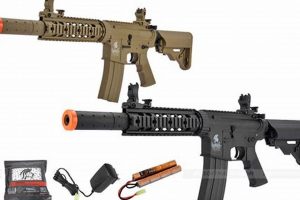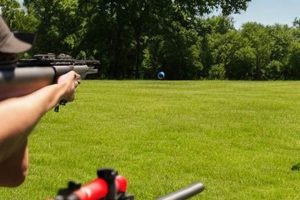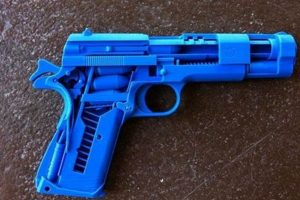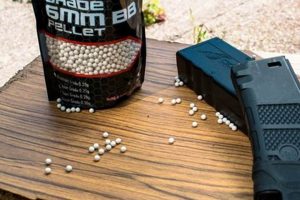The alteration of an airsoft replica firearm by detaching its mandated safety marker, typically a brightly colored blaze orange tip, necessitates careful consideration. This component serves as a visual indicator, distinguishing the item from a real firearm, and its removal can have legal and safety ramifications.
Maintaining the readily identifiable visual distinction between airsoft devices and actual firearms is critical in various contexts. This differentiation can prevent misidentification by law enforcement or the public, averting potential misunderstandings and ensuring personal safety. Historically, these markers were implemented to mitigate risks associated with the public perception of airsoft devices.
Subsequent sections will address common methods employed to detach this specific component, potential legal implications arising from its removal, and essential safety precautions to observe during any modification of an airsoft device.
Disassembly Guidance
The following information outlines prevalent techniques for detaching the mandated safety feature from an airsoft replica. Adherence to all applicable regulations and a strong commitment to safety are paramount.
Tip 1: Heat Application: Gentle heating of the adhesive securing the tip is a common method. Employ a heat gun or hairdryer at a low setting to soften the adhesive. Exercise caution to avoid melting the plastic of the airsoft replica.
Tip 2: Pliers or Wrench Application: Once the adhesive is softened, pliers or a small wrench may be used to carefully twist and remove the tip. Protect the surrounding barrel with tape to prevent cosmetic damage.
Tip 3: Solvent Use: Certain solvents can dissolve the adhesive. Apply a small amount of acetone or a similar solvent to the joint between the tip and the barrel. Allow the solvent to penetrate before attempting removal. Ensure proper ventilation when working with solvents.
Tip 4: Pin Removal: Some models utilize a pin to secure the tip. Inspect the tip for a small pin. If present, carefully remove the pin with a pin punch or similar tool before attempting to twist or pull off the tip.
Tip 5: Threaded Tips: Some orange tips are threaded onto the barrel. Attempt to unscrew the tip by rotating it counterclockwise. Excessive force may damage the threads.
Tip 6: Professional Assistance: If experiencing difficulty or uncertainty, consider seeking assistance from a qualified airsoft technician. A professional possesses the tools and experience to perform the task safely and effectively.
Successful execution of these techniques requires patience and precision. Rushing the process can result in damage to the airsoft device. Legal ramifications must be considered before any alteration of an airsoft replica is attempted.
Subsequent sections will detail the safety considerations necessary during the disassembly procedure, along with a discussion of the legal landscape governing airsoft replica modification.
1. Detachment Methods
The successful removal of an airsoft gun’s orange tip hinges directly upon the employed detachment method. The type of adhesive, the construction of the tip, and the materials of the surrounding barrel dictate which technique is most appropriate. Employing an incorrect method can lead to damage to the airsoft gun’s barrel, rendering it unusable or cosmetically flawed. For instance, forcing a threaded tip with pliers, instead of unscrewing it, will likely strip the threads, requiring potentially costly repairs or replacement parts.
The effectiveness of heat application, solvent usage, or mechanical force varies depending on the specific airsoft gun model. Some manufacturers use strong adhesives that necessitate a combination of heat and solvent application, while others rely on simple friction or threaded connections. Identifying the specific attachment mechanism is crucial. An example involves inexpensive airsoft pistols where the orange tip is often glued on with a potent adhesive; in these cases, heat and slow, steady pressure are often required to prevent the tip from breaking and leaving residue on the barrel.
Selecting and correctly applying an appropriate detachment method is not merely a matter of aesthetics; it is integral to preserving the functionality and value of the airsoft gun. Furthermore, the chosen method can influence legal ramifications, as poorly executed removals can be interpreted differently than a clean, professional detachment. The core understanding remains that the method’s precision and care directly impact the ultimate outcome and potential consequences of altering the airsoft gun’s factory configuration.
2. Adhesive Softening
Adhesive softening represents a pivotal step in the process of removing the orange tip of an airsoft gun when adhesive is the primary bonding agent. Without properly softening the adhesive, attempting to force the tip’s removal invariably results in damage to either the tip itself, the airsoft gun’s barrel, or both. This damage can range from superficial scratches to a complete stripping of threads, rendering the airsoft gun inoperable with regards to future tip attachments. The type of adhesive employed dictates the optimal softening technique; cyanoacrylate-based adhesives (“super glue”) often respond well to acetone, while epoxy resins require heat. The application of inappropriate methods, such as excessive force without adequate softening, is a common cause of irreversible damage.
The process necessitates a controlled application of heat or solvent. Direct, high-intensity heat from a torch can melt the plastic of the airsoft gun, whereas prolonged exposure to potent solvents can degrade certain polymers. A heat gun set to a low setting, or carefully applied heat from a hairdryer, allows for gradual softening without risking structural damage. Similarly, applying solvent via a cotton swab allows for targeted application, minimizing contact with surrounding components. For example, an airsoft rifle with a tip secured by epoxy might require a carefully controlled heat application, monitored with an infrared thermometer to prevent overheating, followed by gentle twisting with pliers once the epoxy has softened sufficiently.
In summary, adhesive softening is not merely a preliminary step, but an integral component of safely and effectively detaching an orange tip. Its success hinges on accurately identifying the adhesive type, selecting the appropriate softening method, and employing a controlled approach to prevent collateral damage. Failure to address this aspect adequately often leads to complications, potentially necessitating professional repair and raising concerns regarding legal compliance due to visible damage resulting from improper removal attempts.
3. Barrel Protection
The integrity of the airsoft gun barrel is inextricably linked to the process of removing the orange tip. The barrel, typically constructed of metal or reinforced polymer, serves as a critical component for projectile accuracy and structural stability. Damage sustained during the detachment procedure can negatively impact these functional aspects, rendering the airsoft gun less effective or entirely unusable. Scratches, dents, or deformations to the barrel’s external or internal surfaces compromise its ability to maintain proper projectile alignment. A common scenario involves the use of pliers without adequate padding, resulting in gouges to the barrel’s finish and potential distortion of its shape. Therefore, proactive barrel protection is not merely a cosmetic concern but a prerequisite for preserving the airsoft gun’s operational capabilities.
Several methods can mitigate the risk of barrel damage during tip removal. Applying multiple layers of protective tape, such as electrical or masking tape, around the barrel immediately adjacent to the orange tip creates a buffer against abrasions from tools. Utilizing specialized barrel vises or soft-jaw pliers distributes pressure evenly, reducing the likelihood of localized damage. Furthermore, employing heat guns or solvents in a controlled manner prevents excessive force from being applied directly to the barrel, mitigating the risk of bending or cracking. For instance, when removing a tip secured with adhesive, carefully heating the joint while simultaneously applying protective tape around the barrel ensures the adhesive softens sufficiently before any rotational force is exerted, minimizing stress on the barrel itself.
In summary, barrel protection is an indispensable element of safely and effectively removing the orange tip from an airsoft gun. Neglecting this aspect elevates the risk of compromising the barrel’s structural integrity and performance, potentially leading to costly repairs or the need for a replacement. By implementing appropriate protective measures and exercising caution, individuals can minimize the potential for damage and preserve the functionality of their airsoft guns. The prudent application of these techniques demonstrates a commitment to responsible modification and adherence to best practices within the airsoft community.
4. Legal Ramifications
The detachment of an orange tip from an airsoft gun carries legal consequences that necessitate careful consideration. Varying federal, state, and local statutes govern the appearance and handling of airsoft replicas, and non-compliance can result in legal penalties.
- Federal Regulations
Federal law mandates that airsoft guns, along with other imitation firearms, possess specific markings or colorations to distinguish them from actual firearms. The orange tip serves as the primary visual indicator for this distinction. Removing this marker can violate federal regulations, potentially leading to fines or other legal repercussions. These regulations are codified in federal statutes concerning the importation and sale of imitation firearms.
- State and Local Ordinances
Beyond federal regulations, many states and municipalities have enacted their own laws concerning airsoft guns. These ordinances often address the possession, display, and transportation of airsoft replicas. In certain jurisdictions, altering the appearance of an airsoft gun to more closely resemble a real firearm may be a criminal offense. For instance, some cities prohibit openly carrying an airsoft gun without an orange tip in public spaces, subjecting violators to fines or even arrest.
- Misrepresentation as a Firearm
Removing the orange tip and subsequently displaying the modified airsoft gun in a manner that leads others to reasonably believe it is a real firearm can have serious legal implications. Such actions may be construed as brandishing or the illegal display of a weapon, even if the device is incapable of firing lethal projectiles. The perceived threat posed by the modified airsoft gun, regardless of its actual capabilities, can trigger law enforcement intervention and criminal charges.
- Impact on Sales and Transfers
The legal ramifications extend to the sale and transfer of airsoft guns from which the orange tip has been removed. Individuals engaging in such transactions may face legal liability if the modified airsoft gun is subsequently used in a manner that violates federal, state, or local laws. Sellers have a responsibility to ensure compliance with all applicable regulations, including the requirement that airsoft guns retain their distinguishing markings.
In conclusion, the act of removing the orange tip from an airsoft gun is not merely a cosmetic alteration but a decision laden with potential legal consequences. Individuals contemplating such modifications must conduct thorough research into applicable federal, state, and local laws to ensure compliance and avoid legal penalties. The legal landscape is complex and subject to change, requiring ongoing vigilance and a commitment to responsible ownership and modification of airsoft replicas.
5. Safety Precautions
The procedure of removing the orange tip from an airsoft gun mandates stringent adherence to safety precautions, as the inherent risks associated with tool usage and potential material exposure necessitate a cautious approach. The application of heat, solvents, or mechanical force, all common elements in detachment methods, presents opportunities for personal injury or damage to the airsoft gun. A failure to implement adequate safety measures directly increases the likelihood of accidents, such as burns from heat guns, chemical exposure from solvents, or physical trauma from mishandled tools. For example, neglecting to wear safety glasses while using a rotary tool to grind down adhesive residue can result in eye injuries from flying debris.
Appropriate safety precautions encompass a multi-faceted approach, including personal protective equipment (PPE), controlled work environments, and thorough understanding of the materials involved. Safety glasses protect against projectiles and debris, while gloves minimize skin contact with potentially harmful chemicals. Adequate ventilation is crucial when using solvents to prevent the inhalation of toxic fumes. A clear, well-lit workspace reduces the risk of accidental slips or misjudgments. Moreover, familiarity with the Material Safety Data Sheets (MSDS) for any solvents or adhesives used provides critical information regarding potential hazards and appropriate first aid measures. A practical example includes working with acetone to dissolve adhesive; ensuring proper ventilation by opening windows or using a fume hood mitigates the risk of respiratory irritation.
In conclusion, the integration of safety precautions into the process of removing an orange tip is not merely a supplementary measure but an essential prerequisite for responsible and effective modification. Neglecting these safeguards elevates the risk of personal injury and damage to equipment. A proactive approach, incorporating PPE, controlled environments, and a thorough understanding of material hazards, minimizes the potential for accidents and promotes a safer working environment. The adherence to these principles reflects a commitment to responsible airsoft gun ownership and modification practices.
6. Damage Prevention
Damage prevention is intrinsically linked to the process of orange tip removal from airsoft guns. The improper application of techniques can readily result in cosmetic or functional impairments, compromising the replica’s value and operational capacity. Employing excessive force during detachment, utilizing inappropriate solvents, or mishandling heat sources are prime contributors to damage. For example, the application of direct flame to melt adhesive frequently causes irreversible melting of the surrounding plastic components. Scratches on the barrel’s exterior surface induced by improper tool usage diminish the resale value of the item and can even affect its accuracy. Preventing such damage requires a deliberate and informed approach, prioritizing controlled methods and appropriate tools.
Effective damage prevention strategies involve several key considerations. Prior to commencing removal, identifying the attachment method (adhesive, threaded, pinned) is paramount. Matching the removal technique to the specific attachment mechanism minimizes the potential for unintended consequences. For adhesive-based attachments, the gradual application of heat using a heat gun, coupled with the judicious use of solvents compatible with the replica’s material composition, reduces the risk of warping or dissolving plastic. Utilizing protective padding around the barrel, when applying mechanical force with tools such as pliers, prevents surface abrasions. Careful execution and patience are crucial; rushing the process often leads to errors and subsequent damage. A scenario illustrating this is attempting to unscrew a tightly affixed, threaded tip without proper lubrication; applying penetrating oil beforehand mitigates the risk of stripping the threads on the barrel.
In summary, damage prevention is not merely an ancillary concern, but an essential element in successfully removing an orange tip from an airsoft gun. The application of appropriate techniques, coupled with a meticulous and deliberate approach, minimizes the risk of cosmetic and functional impairments. While the desire to alter the appearance of an airsoft replica may be strong, prioritizing damage prevention ensures the continued usability and value of the device. Challenges remain in accurately identifying attachment methods and selecting compatible materials, underscoring the need for thorough research and cautious execution. The ability to effectively prevent damage is directly proportional to the successful and responsible modification of airsoft replicas.
7. Tool Selection
The selection of appropriate tools is paramount to the successful and safe detachment of an orange tip from an airsoft gun. The task necessitates consideration of various factors, including the tip’s attachment method, the materials of the airsoft gun, and the potential for damage during the removal process. Inadequate tool selection can lead to cosmetic or functional damage, compromising the airsoft gun’s value and performance. The following facets outline key considerations in selecting tools for this specific task.
- Heat Application Tools
When adhesive secures the orange tip, heat application is frequently employed. Tool selection in this instance centers on controlling heat intensity and distribution. A heat gun with adjustable temperature settings allows for precise heat application, minimizing the risk of melting or warping plastic components. Hair dryers, while less precise, can serve as a gentler alternative for heat-sensitive materials. Open flames, such as lighters or torches, are generally unsuitable due to the difficulty in controlling heat and the high risk of damage. Example: A heat gun set to low is preferable to a lighter for loosening glue on a polymer barrel.
- Mechanical Force Tools
When the orange tip is threaded or friction-fit, mechanical force is often required for removal. Tool selection here prioritizes controlled grip and force application. Pliers, wrenches, or specialized barrel vises can provide leverage, but must be used with caution to avoid scratching or deforming the barrel. Soft-jaw pliers or padding applied to standard pliers can mitigate the risk of surface damage. Example: Using padded pliers is better than unpadded pliers when twisting off a stubborn threaded tip.
- Solvent Application Tools
Certain solvents can assist in loosening adhesive bonds. Tool selection in this context emphasizes precise solvent application and material compatibility. Cotton swabs, small brushes, or syringes allow for targeted solvent application, minimizing contact with surrounding components. The selected tools must be resistant to degradation from the solvent. Example: A small brush is useful for applying solvent precisely to the joint between the tip and barrel.
- Cutting and Grinding Tools
In some cases, the orange tip might require cutting or grinding for removal, especially if heavily glued or damaged. Tool selection focuses on precision and control to prevent collateral damage. Rotary tools with cutting or grinding attachments can be used, but must be operated at low speeds and with a steady hand. Protective eyewear is mandatory when using such tools. Example: A rotary tool with a cutting wheel can carefully cut the orange tip if it is cracked and unable to be removed using other methods, use safety glasses is important during the process to prevent eye injury.
The overarching principle in tool selection for orange tip removal is matching the tool’s capabilities to the specific task while minimizing the risk of damage to the airsoft gun or injury to the user. Careful consideration of the attachment method, material properties, and required force levels dictates the optimal tool choices. Proper tool selection, combined with methodical execution, increases the likelihood of a successful and safe orange tip removal.
Frequently Asked Questions
This section addresses common inquiries regarding the process of detaching the orange tip from an airsoft gun, providing factual information and clarifying prevalent misconceptions.
Question 1: Is the removal of the orange tip from an airsoft gun legal?
Legality varies by jurisdiction. Federal law mandates the presence of an orange tip or equivalent marking during import and sale, but local and state regulations concerning possession and modification may differ significantly. Consult applicable laws before proceeding.
Question 2: What is the primary purpose of the orange tip on an airsoft gun?
The orange tip serves as a visual indicator, distinguishing the airsoft replica from a real firearm. This distinction is intended to prevent misidentification by law enforcement or the public, minimizing potential risks associated with the handling and display of airsoft guns.
Question 3: What are the potential consequences of possessing an airsoft gun without an orange tip?
Possessing an airsoft gun without the mandated orange tip can result in legal penalties, including fines, confiscation of the device, and potential criminal charges, depending on the specific jurisdiction and circumstances. Misrepresenting the airsoft gun as a real firearm can further exacerbate legal ramifications.
Question 4: What is the safest method for removing an orange tip secured with adhesive?
The safest method involves the controlled application of heat to soften the adhesive, followed by gentle twisting and pulling. Use a heat gun set to a low temperature and protect the surrounding barrel with tape. Avoid excessive force, which can damage the airsoft gun. Solvents may also be used, but ensure they are compatible with the airsoft gun’s materials.
Question 5: Can removing the orange tip affect the performance of an airsoft gun?
While the orange tip itself does not directly affect performance, improper removal techniques can damage the barrel, leading to decreased accuracy or functionality. Exercise caution and employ appropriate tools and methods to prevent damage.
Question 6: Is it possible to reattach an orange tip after it has been removed?
Reattaching an orange tip is possible, but may require specialized adhesives or techniques, depending on the original attachment method. It is crucial to ensure that the reattached tip is securely affixed and complies with all applicable regulations.
The removal of the orange tip presents safety and legal risks that necessitates carefully consideration. Informed decision-making and adherence to best practices are crucial for responsible modification.
The next section examines practical considerations and best practices for those choosing to proceed with orange tip removal.
Conclusion
This exposition has explored the multifaceted process of how to remove the orange tip of an airsoft gun. Topics addressed encompassed detachment methodologies, the imperative of barrel protection, legal ramifications, stringent safety precautions, damage prevention techniques, and informed tool selection. Each element necessitates deliberate consideration to ensure a responsible and legally compliant modification process.
Individuals contemplating this modification must recognize the interplay between practical execution, legal compliance, and safety considerations. While modifying an airsoft replica may seem straightforward, the potential ramifications necessitate a thorough understanding of applicable regulations and a commitment to responsible handling. Continued vigilance and a dedication to ethical practices within the airsoft community are paramount.







